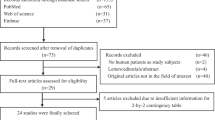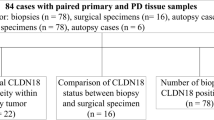Abstract
Background
This study was undertaken to determine the absolute and relative value of angiogenesis, proliferating cell nuclear antigen (PCNA) and conventional prognostic factors in predicting relapse-free survival (RFS) and overall survival (OS) rates associated with long-term survival in Japanese patients with node-negative breast cancer.
Patients and Methods
Two hundred patients with histological node-negative breast cancer were studied. We investigated nine clinicopathological factors, including angiogenesis, PCNA using permanent-section immunohistochemistry, clinical tumor size, histological grade (HG), tumor necrosis, lymphatic vessel invasion (LVI), histological extension, histological classification, and infiltrating growth (INF), followed for a median of 10 years (range, 1 to 20).
Results
Twenty-one patients (10.5%) had recurrence and 15 patients (7.5%) died of breast cancer. Univariate analysis showed that PCNA, clinical tumor size, HG, angiogenesis, and LVI were significantly predictive of 20-year RFS or OS. Tumor necrosis was significantly predictive of OS, not of RFS. Multivariate analysis showed that clinical tumor size (P=0.0003), angiogenesis (P=0.0003), PCNA (P= 0.0064), and HG (P=0.0401) were significant independent prognostic factors for RFS. PCNA (P< 0.0001) and clinical tumor size (P=0.0112) were significant independent prognostic factors for OS, while angiogenesis was a borderline significant factor.
Conclusion
PCNA and angiogenesis were important new prognostic factors in node-negative breast cancer patients.
Similar content being viewed by others
Abbreviations
- PCNA:
-
Proliferating cell nuclear antigen
- RFS:
-
Relapse-free survival
- OS:
-
Overall survival
- HG:
-
Histological grade
- LVI:
-
Lymphatic vessel invasion
- INF:
-
Infiltrating growth
- AMC:
-
Average microvessel count
- RR:
-
Relative risk
- HMC:
-
Highest microvessel count
References
Mansour EG, Gray R, Shatila AH,et al: Efficacy of adjuvant chemotherapy in high-risk node-negative breast cancer.N Engl J Med 320:485–490, 1989.
Fisher B, Dignam J, Mamounas EP,et al: Sequential methotrexate and fluorouracil for the treatment of node-negative breast cancer patients with estrogen-receptor-negative tumors; Eight-year results from national surgical adjuvant breast and bowel project (NSAB) B-13 and first report of findings from NSABP B-19 comparing methotrexate and fluorouracil with conventional cyclophosphamide, methotraxate, and fluorouracil.J Clin Oncol 14:1982–1992, 1996.
Davis BW, Gelber RD, Goldhirsch A,et al: Prognostic significance of tumor grade in clinical trials of adjuvant therapy for breast cancer with axillary lymphnode metastasis.Cancer 58:2662–2670, 1986.
van de Velde CJH, Gallager HS, Giacco GG: Prognosis in node-negative breast cancer.Breast Cancer Res Treat 8:189–196, 1986.
Lee AKC, Delellis RA, Silverman ML,et al: Prognostic significance of peritumoral lymphatic and blood vessel invasion in node-negative carcinoma of the breast.J Clin Oncol 8:1457–1465, 1990.
Clayton F: Pathologic correlates of survival in 378 lymphnode-negative infiltrating ductal breast carcinomas; Mitotic count is the best single predictor.Cancer 68:1309–1317, 1991.
Clemente CG, Boracchi P, Andreola S,et al: Peritumoral lymphatic invasion in patients with nodenegative mammary duct carcinoma.Cancer 69:1396–1403, 1992.
Gasparini G, Weidner N, Bevilacqua P,et al: Tumor microvessel density, p53 expression, tumor size, and peritumoral lymphatic vessel invasion are relevant prognostic markers in node-negative breast carcinoma.J Clin Oncol 12:454–466, 1994.
Kato T, Kimura T, Muraki H,et al: Clinicopathological features associated with long-term survival in node-negative breast cancer patients.Surg Today 26:105–114, 1996.
Kato T, Kimura T, Miyakawa R,et al: Clinicopathological study associated with long-term survival in Japanese patients with node-negative breast cancer.Br J Cancer. In press.
O’malley FP, Saad FZ, Kerkvliet N,et al: The predictive power of semiquantitative immunohisto-chemical assessment of p53 an.c-erbB-2 in lymph node-negative breast cancer.Hum Pathol 27:955–963, 1996.
Weidner N, Semple JP, Welch WR,et al: Tumor angiogenesis and metastasis-correlation in invasive breast carcinoma.N Engl J Med 324:1–8, 1991.
Weidner N, Folkman J, Pozza F,et al: A new significant and independent prognostic indicator in early-stage breast carcinoma.J Natl Cancer Inst 84:1875–1887, 1992.
Simpson JF, Ahn C, Battifora H,et al: Endothelial area as a prognostic indicator for invasive breast carcinoma.Cancer 77:2077–2085, 1996.
Kato T, Kimura T, Miyakawa R,et al: A clinicopathologic study of angiogenesis in Japanese patients with breast cancer.World J Surg 21:49–56, 1997.
Fregene T, Khanuja PS, Gimotty P,et al: Angiogenesis does not predict recurrence in patients with primary breast cancer.Am Soc Clin Oncol 12:67, 1993. Abstract.
Van Hoef MEHM, Knox WF, Dhesi SS,et al: Assessment of tumor vascularity as a prognostic factor in lymph node negative invasive breast cancer.Eur J Cancer 29:1141–1145, 1993.
McCaskill-Stevens W, Broshers J: Angiogenesis and survival in breast cancer patients aged thirty five and under.Am Soc Clin Oncol 14:124, 1995. Abstract.
Goulding H, Rashid NFNA, Robertson JF,et al: Assessment of angiogenesis in breast carcinoma: An important factor in prognosis.Hum Pathol 26:1196–1200, 1995.
Kato T, Kimura T, Ishii N,et al: The methodology of quantitation of microvessel density and prognostic value of neovascularization associated with long-term survival in Japanese patients with breast cancer.Breast Cancer Res Treat 53:19–31, 1999.
The Japanese Breast Cancer Society: General Rules for Clinical and Pathological Recording of Breast Cancer, 13th edition, Kanehara Co, Tokyo, pp8–29, 1998.
Japanese Research Society for Gastric Cancer: Japanese Classification of Gastric Cancer, first English edition, Kanehara Co, Tokyo, pp44–45, 1995.
Bloom HIJ, Richardson WW: Histologic grading and prognosis.Br J Cancer 11:359–377, 1957.
Kaplan EL, Meier P: Non parametric estimation from incomplete observations.J Am Stat Assoc 53:457–481, 1958.
Mantel N: Evaluation of survival data and two new rank order statistics arising in its consideration.Cancer Chemother Rep 50:163–170, 1966.
Cox DR: Regression models and life tables.J R Stat Soc B 34:187–202, 1972.
Lauria R, Perrone F, Carlomagna C,et al: The prognostic value of lymphatic and blood vessel invasion in operable breast cancer.Cancer 76:1772–1778, 1996.
Rosen PP, Groshen S, Saigo PE,et al: A long-term follow-up study of survival in Stage I (T1N0M0) and Stage II (T1N1M0) breast carcinoma.J Clin Oncol 7:355–366, 1989.
Sears HF, Janus C, Levy W,et al: Breast cancer without axillary metastases; Are there high-risk biologic subpopulations.Cancer 50:1820–1827, 1982.
McGuire WL, Tandon AK, Allred DC,et al: How to use prognostic factors in axillary node-negative breast cancer patients.J Natl Cancer Inst 82:1006–1015, 1990.
Isola JJ, Helin HJ, Helle MG,et al: Evaluation of cell proliferation in breast carcinoma; Comparison of Ki-67 immunohistochemical study, DNA flow cytometric analysis, and mitotic count.Cancer 65:1180–1184, 1990.
Bianchi S, Paglieranti M, Zampi G,et al: Prognostic value of proliferating cell nuclear antigen in lymph node-negative breast cancer patients.Cancer 72:120–125, 1993.
Sitonen SM, Kallioniemi OP, Isola JJ: Proliferating cell nuclear antigen immunohistochemistry using monoclonal antibody 19A2 and a new antigen retrieval technique has prognostic impact in archival paraffin-embedded node-negative breast cancer.Am J Pathol 142:1081–1089, 1993.
Barbareschi M, Caffo O, Veronese S,et al: Bcl-2 and p53 expression in node-negative breast carcinoma; A study with long-term follow-up.Hum Pathol 27:1149–1155, 1996.
Tandon AK, Clark GM, Chamnes GC,et al: Cathepsin D and prognosis in breast cancer.N Engl J Med 322:297–302, 1990.
Haagensen CD: The relation of age to the frequency of breast carcinoma. In: Haagensen CD eds, Disease of the Breast, 3rd ed, Saunders Company, Philadelphia, pp402–407, 1986.
Wynder EL, Kajitani T, Kuno J,et al: A comparison of survival rates between American and Japanese patients with breast cancer.Surg Gynecol Obstet 117:196–200, 1963.
Stemmermann GN, Catts A, Fukunaga FH,et al: Breast cancer in women of Japanese and Caucasian ancestry in Hawaii.Cancer 56:206–209, 1985.
Author information
Authors and Affiliations
About this article
Cite this article
Kato, T., Kimura, T., Takami, N. et al. New prognostic factors associated with long-term survival in node-negative breast cancer patients. Breast Cancer 6, 370–377 (1999). https://doi.org/10.1007/BF02966456
Issue Date:
DOI: https://doi.org/10.1007/BF02966456




